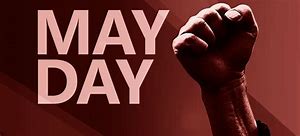 Today is May Day – Day of International Working-Class Unity and Struggle. This year May Day will be different in the way in which workers celebrate it. But its significance is not diminished. Celebrations in the form a mass gatherings, marches and rallies are suspended by the global pandemic threat created by the COVID-19 virus with deadly effect and the responses to it. However, the effects of those measures on the livelihood of huge numbers of workers and working people by job losses, non-payment of salaries and wages and other onslaught on their living conditions, demonstrate the necessity for their solidarity and organisation in their fight to protect and advance their interests. The representatives of big business interests are also seizing the opportunity to advance demands to roll back the gains won by the workers in their struggle for political, economic, trade union, social and other rights. Recently, in T&T, under the guise of protecting individual rights, business spokesmen have renewed their call to curtail trade union rights won by huge sacrifices since the days of 1937 Butler Riots. Imagine those, who routinely dismiss minimum wage workers at the first hint of their interest in organising for union membership, piously claiming to respect and defend workers’ Constitutional freedom of association. They claim that compensation awards to workers by the Industrial Court are ‘crippling businesses’ but say nothing about the savagery of their attacks on the workers which drive them to seek redress in the first place. Now, those who continue to collect huge contract fees and rents from the state and even are awarded new contracts while workers suffer loss of jobs and incomes, hypocritically demand protection from ‘retrospective profiteering’ by workers and their unions out of the lockdown and measures like lay-offs without even payment of wages already earned. Hiding behind false concerns for the “community and national interests” this minority which extracts maximum profit from the exploitation of the workers’ labour that their businesses are being “crippled by excessive” awards to workers for harsh and oppressive industrial relations abuses. They claim pious conversion to concern for individual Constitutional Rights of workers, while being the minority who benefit most from their ownership and control of the economic resources of society. Conveniently, they also ignore the words of the very Constitution which purports respect for social justice and that the economic system that should result in the “material resources” being used to “subserve the common good”. Their real demand is for Private Right of the 1% monopoly interests over the Public Right of the majority of the society. The workers all over the world must remain vigilant and resolute in the fight for their historical role to create the genuine New in which they decide the direction of the economy, guarantee the rights of all, protect and improve the natural and social environments and determine a future in favour of public right versus private right, in favour of peace and not war and in favour of freedom and not exploitation and oppression. Emerging out of the COVID response, the workers must step up their efforts to unite, organise and engage in actions to defend and advance their Rights and to advance the aims of May Day. Clyde Weatherhead A Citizen Fighting for Democratic Renewal of Our Society 1 May 2020  I find myself more frequently using politically correct phrases (though I despise the term itself). Perhaps, it is fortunate that ‘political correctness’ was foisted on our language since the alternative is that we would have to resort to using ‘two bad wud’ in many situations. This past week may end up being my most personal politically correct week of my entire life. When the Health Minister jumped in the brew of the sterile and possibly utterly useless (in social terms) debate and declared the choice is “Rights or Death”, it is ‘a binary choice’, I had to shout within ‘how unfortunate’. There is NO choice between Rights and Death. The entire bruhaha has arisen over different opinions concerning the measures adopted by the Government to address the COVID19 ‘emergency’ or ‘crisis’ as the PM described it from early o’clock. Yes, there is a serious threat to the health and lives of the citizens of this country. In fact, as the statistics of this declared pandemic show, as at today’s date, more than 210 countries and territories are affected with 2,958,375 cases and 205,407 dead. The vast majority of cases and death in the countries which are labelled ‘first world’ or most advanced or develop among the global nations. Our country is second only to Jamaica in cases but first in deaths in the English-speaking Caribbean. This is a health threat of humungous proportions. The measures taken by almost all countries are similar in content, if not form, as dictated by the necessity to avoid the worst effects of infection among populations and the fact that there is yet no proven cure or preventive medical tool. Every country, according to their own legal provisions, social system, culture, etc. have reacted in much the same way. Rights and Life (a fundamental Right itself) are not in competition or contradiction. In this country, there is a dilemma for any administration in this situation. In the face of a public health threat of this proportion, our laws contain two strands of legal weaponry – the public health legislation – the century old unamended Public Health Ordinance and the Quarantine Act of World War II vintage amended last in 1978 and the Emergency Powers in the Constitution (Part III section 7) which will of necessity suspend all Constitutional Rights if invoked. The choice of legal weaponry is a political choice of Government possibly more so than a legal decision as the incredibly old public health law is ‘saved’ (preserved) by the very Constitution (section 6). That choice of legislation to use is NOT a binary choice either. In different Caribbean countries, either or both have been employed by various governments). The irreconcilable contradiction – binary choice – that the Health Minister believes exist is simply a figment of his political imagination. Historically, governments in this country have almost exclusively used the emergency powers of the Constitution and the Emergency Powers Act before it, for political purposes including silencing opposition political parties, putting down real or perceived threats to Government from the masses, smaller groups or even an individual House Speaker. So, the reluctance of the present PNM administration to utilise those powers in ‘public emergency’ including ‘the occurrence of…infectious disease..”(s. 8 (2)), unlike previous incarnations of that particular party-in-power as political choice is apparent. The option of ‘Moral suasion’ is not enforceable law. It is Government policy at best, self-comfort at worst. The ancient Public Health Ordinance provides the possibility of measures to combat the spread and worst effects of the rampaging infectious disease. The only additional tool provided by the Emergency Powers is the complete suppression of fundamental Rights and expansive police powers. The problems that have arisen have not arisen because of the legislation or the Government’s choice of legislative weaponry but from the implementation and enforcement by “law enforcement” as is now fashionable to refer to them. I also had to be politically correct, though horrified, when the Commissioner declared the or one role of ‘law enforcement’ is the implementation of Government policy, to again declare, how unfortunate. The Independence of which from political interference or direction has been clear since the days of the seminal Privy Council decision in Endel Thomas v the AG, a pillar of our Constitutional law and which this CoP has defended on many occasions. Perhaps, the most dangerous thing in choosing to use archaic legislation which every Government since Independence has promised but failed to modernise except the increase in penalties for breach of Regulations by this Parliament in this crisis, is the assumption by law enforcement of ‘powers I think I have, I DO NOT’. For those, who claim they have scored a major victory for exposing this fundamental flaw without going to the point of demanding correction of the law, in a basic social development and governance improvement sense, there is no real advance. As the Health Minister has erected the ‘windmill’ of binary choice, so too, have those who have sought little more than to score points, political or otherwise, against the Government, but have made no contribution to advancing our Governance in preparation for the next episode of public emergency of this type. In this land of robber talk and double entendre (intend) sorting through the political posturing on ‘both sides’ as Daly SC put it this week, it is difficult to maintain my ‘politically correct’ posture and demand that the 2-party political monopoly desist from their self-serving ambitions and put the National Purpose First. Clyde Weatherhead A Citizen Fighting for Public Right over Private Right. 26 April 2020  The current annual food import bill of Trinidad and Tobago stands in excess of $5 Billion Dollars (TT). There is no coherent agricultural development policy or plan. There is no Food Security or Food Self-Sufficiency plan from official quarters. In developing proposals for a Recovery and Beyond Plan, proposals for the agricultural sector and feeding the nation are included. Below is Part 1 which provides an analysis, in brief, of how and why this country has moved from being a net exporter of cash and food produce to being a net importer with massive food import bills which have skyrocketed in the last 5 decades. ************ Let’s start this story from the start. In the beginning, there was colonial conquest and annexation of these 2 islands (and the others of this island chain). Agriculture using unpaid labour of dehumanized slaves and later, indentured labour, producing mainly inputs for the factories of the colonial power. The produce from these islands were called primary exports and the economies of these annexed lands were called plantation economies. The main crops were sugar and cocoa - the monocrops here. The other Caribbean islands produced bananas and other crops. These crops were so important to the imperial power’s manufacturers and merchants that they created an Imperial College of Tropical Agriculture (ICTA) in Trinidad, on August 30, 1921, to do research to boost production of the various input crops produced throughout the British Empire. For instance, bulk cocoa production was done in Africa and the taste of the chocolates produced in England was improved by the ‘premium’ flavouring cocoas bred by the ICTA and grown in these 2 islands mainly. Food crops necessary to keep the labour power alive and working was just enough for that purpose. After Emancipation (1834) and again after the end of Indentureship (1917), food production expanded by the ‘free’ labourers to supply the domestic demand. In Tobago, partly because of the Metayage system under which the ex-slaves produced mainly food crops, food production flourished. By the 1920’s, Tobago was called the Food Basket of the Caribbean, exporting food crops, fruits, etc to Trinidad and other Caribbean islands as well as Venezuela. In Trinidad, food production including vegetables and rice expanded in different parts of the island. Coconut and citrus production were also large scale and provided inputs on the island - Coconut and Citrus Growers Associations - located near the capital. The products of these factories became export products. By Independence (1962) oil production in Trinidad and tourism in Tobago, to a much lesser degree, became major GDP contributors. Oil replaced sugar and cocoa as the major export ‘monocrop’ and main source of Government Revenue. Estates (cocoa, coconut, citrus) all over the country were in difficulty. The Central Marketing Agency’s (CMA now NAMDEVCO) farmgate truck collection system for food crops in Tobago was abandoned. Agricultural production overall began to decline. The abuse of the best agricultural lands (according to the land capability study published in 1965) for housing in Diego Martin, Valsayn, etc in Trinidad and for hotel development at Mt. Irvin and elsewhere in Tobago expanded. Livestock farming was allocated to some of the least productive soils making grass-fed animal production almost impossible. A series of Oil and Food Conferences in the 1970’s promoted the notion of large scale ‘mega farm’ production (1000 acres, etc) to develop new export crops - Corn and Soya at Chaguaramas and Piarco, for example. Land tenure issues facing small farmers have never been satisfactorily resolved. The import and distribution of agricultural inputs from seeds, chemicals, feeds, machinery and equipment were monopolized by the merchant conglomerates. They also controlled the import and distribution of processed foods through the wholesale merchant and retail supermarket chains. Small farmers producing vegetables and root crops were marginalized on both islands with poor marketing systems, land tenure issues, hostile competition from imported food products, poor irrigation and drainage systems, competition for labour from Government make-work schemes from Special Works to DEWD, LID to CEPEP. The dairy production to feed the multinational Nestlé factory (which squeezed out local milk producers) expanded and eventually died as the factory abandoned production here for more profitable imported products. The same multinational also destroyed the citrus industry in similar manner. Despite the Government and UWI agriculture faculty (successor of the ICTA) research in small ruminant agriculture, including the Sugarcane Feed Centre, the sector has declined on both islands because of marketing and other issues. Rice production has also suffered a similar fate. The only large scale production that has succeeded is the poultry industry with a monopoly of processors extracting profits based on onerous contract farming arrangements and later their own ‘factory farming’ establishments. The “localization” of the failing sugar industry in the wake of the 1970 Revolution failed to save the industry largely because of failure of Government to implement measures recommended in several reports from Government-appointed Committees on the industry. The IADB agriculture sector loan contracted by one regime in the early 90’s and drawn down by the other in the late 90’s was used to finally shut down the industry. Again, the importers interests won out. There has been NO coherent agricultural plan or food security policy by all Governments for the last 58 years of Independence. Research and proposals for import substitution like Professor Sammy’s cassava flour production project in the 1970’s; the Sugarcane Feed Centre (SFC) sugar cane/molasses feeding technology for dairy and small ruminants; the Buffalypso project have not been aggressively applied/rolled out by successive Governments even when they funded them. The SFC technology is being utilized in Suriname, but not widely in TT where it was developed. State agencies in financing, marketing, imparting in the agricultural sector have made no real difference in the absence of a coherent development policy for the agriculture sector of the economy and the over-reliance on the hydrocarbon sector and absence of a strategy and action to diversify the productive base of the economy. The food importers, including those with monopoly control imports of inputs continue to be the biggest beneficiaries in the sector. |
AuthorI am a appalled at the loss of the simple skills of discussing ideas and sharing Opinions to DEEPEN ANALYSIS and UNDERSTAND DEVELOPMENTS to ARRIVE AT SOLUTIONS. Archives
April 2024
Categories |

About Clyde Weatherhead
Clyde has been involved in public life as a political activist, a trade unionist, Lawyer, Teacher and Author |
Connect With Clyde
Write to Clyde on Facebook Visit Clyde's Author Page on Amazon Go To Discussion on Facebook For Employment Relations Issues |

 RSS Feed
RSS Feed